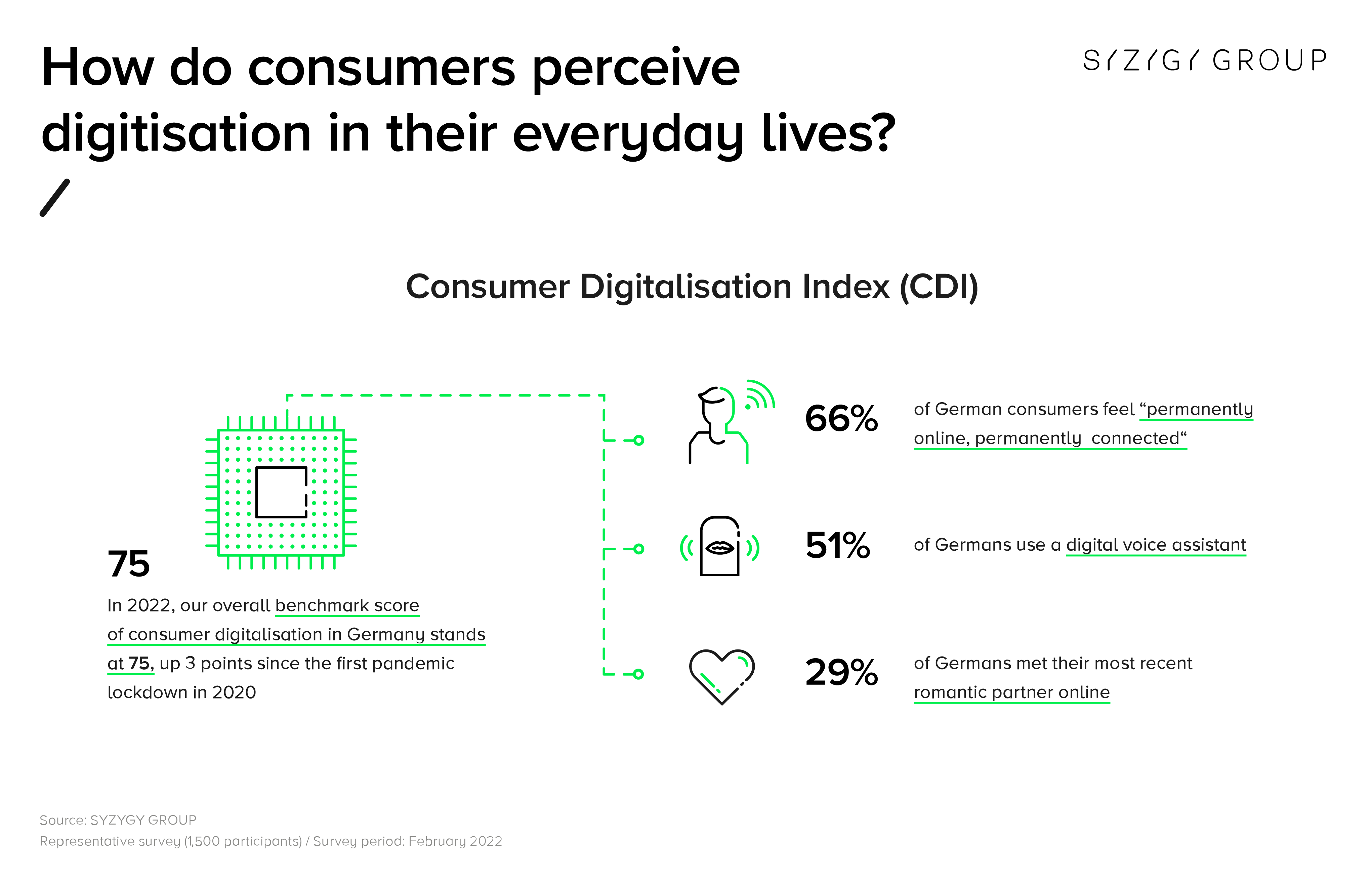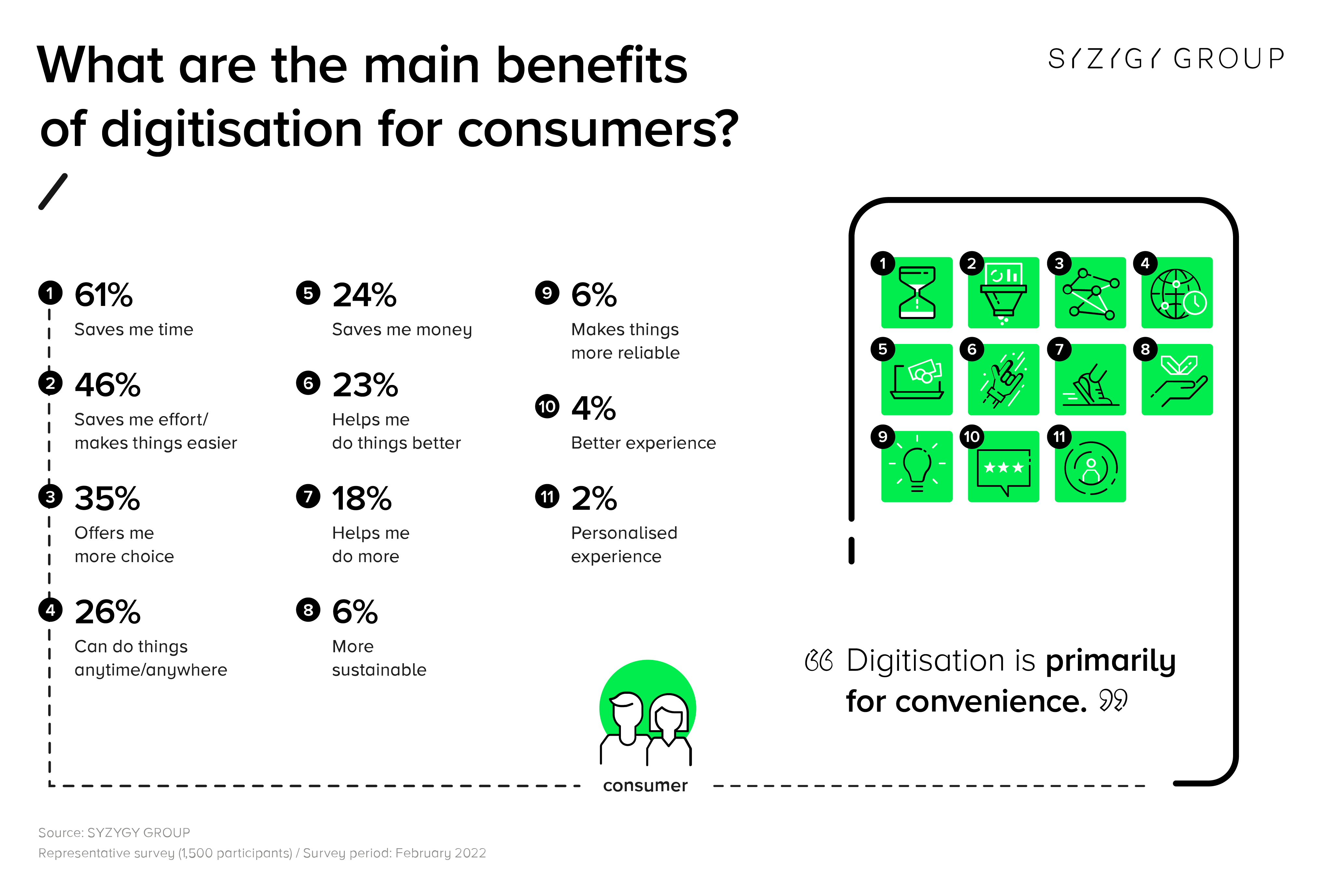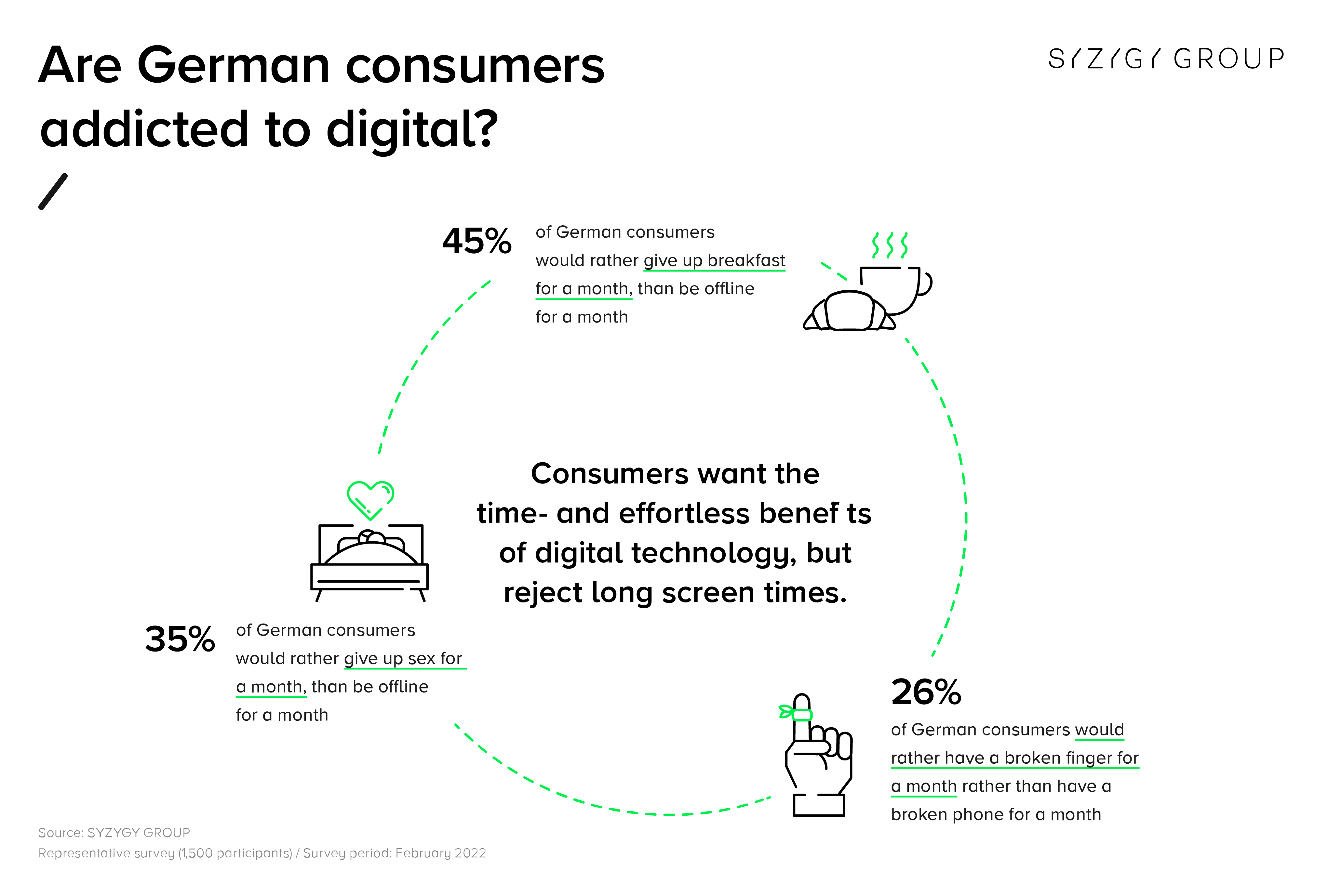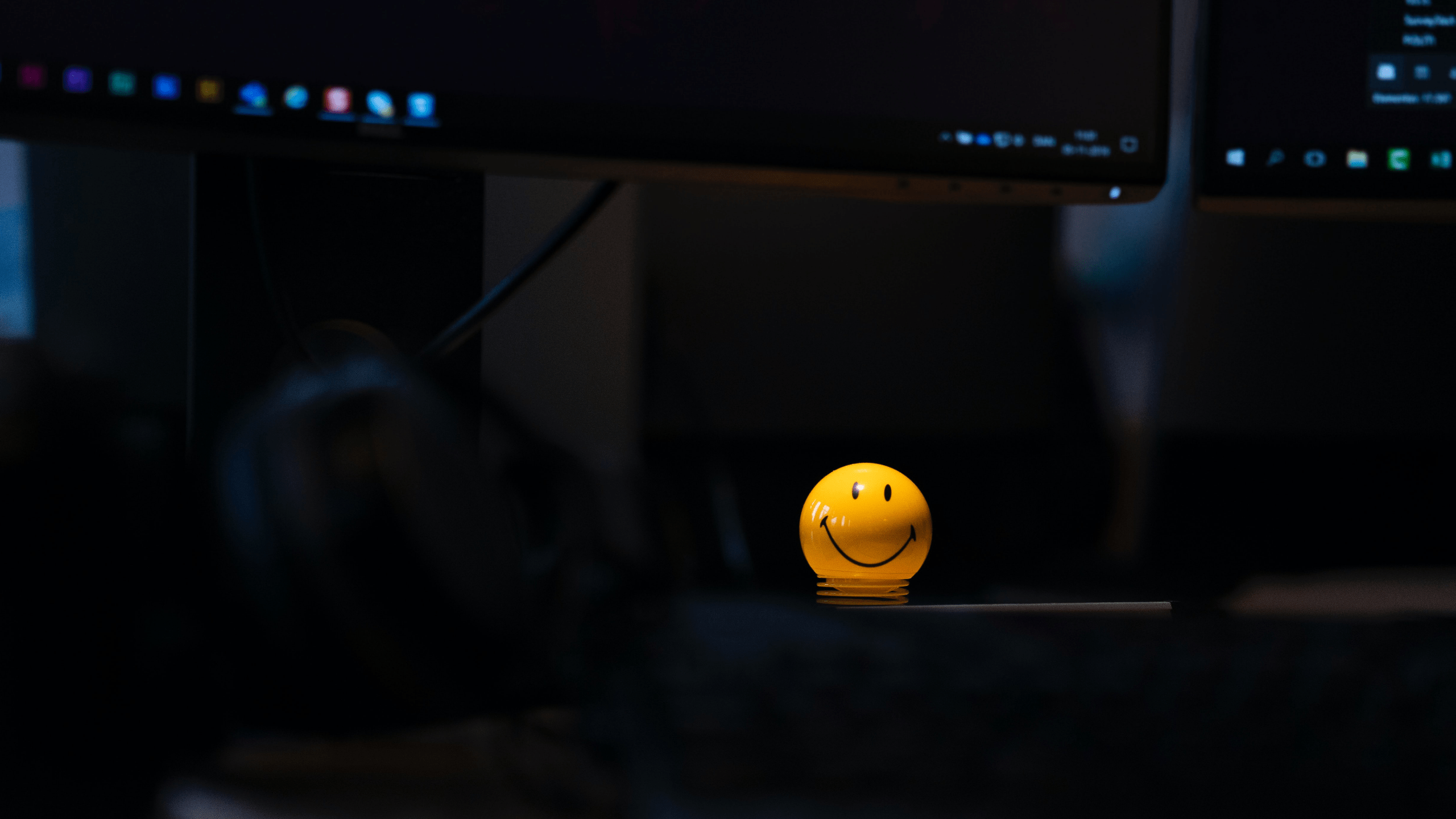Why is SYZYGY GROUP establishing this new index?
Because we believe it will allow us to explore and answer the following key questions:
How do consumers perceive digitalization in their everyday lives? Do digital technologies contribute to a better sense of well-being? And what does this mean for companies that want to reach their customers with digital products and services?

In our population-balanced, representative survey of 1,500 adults across Germany, we found that during the pandemic, access to and use of digital technology in everyday life was statistically linked to ‘satisfaction with life’, commonly seen as the clearest indicator of wellbeing. Specifically, consumers with the most digitalised lives during the pandemic, as defined by our new Consumer Digitalisation Index, had a wellbeing score that was 10 per cent higher than those with the least digitalised lives.
Overall, more digitalised consumers experienced higher levels of wellbeing.
Of course, the usual caveats apply for this kind of exploratory survey-based research, including the possibility of confounding variables and the inability of surveys to assess the direction of causality. Although the link between digitalisation and wellbeing is highly statistically significant (p< 0.01), this link itself is fairly weak (r = 0.15). This simply means that not all people with greater access to digital connectivity during the pandemic experienced higher than average levels of wellbeing.
But on balance, and overall, many did.
This will resonate with many. Digital connectivity during the pandemic allowed many of us to continue doing the things known to protect our wellbeing, such as staying in control of our lives, remaining connected to our loved ones, and feeling confident and competent in our ability to deal with challenge and disruption.
Nevertheless, we believe our inaugural SYZYGY GROUP’s CDI report is one of the very first investigations to confirm, with hard evidence, that digital has indeed been good to us during the pandemic.

Convenience-tech: making life easier during challenging times
Convenience-tech: making life easier during challenging times
So how has digital connectivity supported wellbeing during the pandemic? To answer this question, we asked our CDI survey respondents about the benefits of digital technology.
Our key finding is that digitalisation is primarily about convenience for consumers. Convenience means saving time and effort, and overall, 61 per cent cited the time-saving convenience of digital as one of the top three benefits.
46 per cent emphasised effort-saving convenience, and 26 per cent stressed the convenience of being able to complete tasks at any time and in any location as a key benefit of a more digitalised life. Overall, when people think of the benefits that digital can bring to their lives, they think in terms of convenience.
Again, these results will not come as a surprise to many. We choose digital solutions not necessarily because they are better or offer a more personalised or superior experience, but primarily because they are convenient – they save us time and effort in our busy lives by allowing us to do things quickly and easily. Overall, this finding fits with the basic psychology of technology, which states that technology has positive psychological effects when it promotes ‘self-determination’ by allowing us to exert control and competence in our lives.
Of course, our research was conducted during the pandemic, and this may have skewed our results. Nevertheless, the idea that ‘convenience is king’ in consumer lives is a perennial truism, and convenience is something that digital can deliver in spades.
The business implication of our CDI data is simple. In a hyped world of digital fads, currently dominated by the metaverse, crypto-assets and digital engagement, most businesses would profit from a back-to-basics focus on convenience when it comes to digital strategy. Our data suggests that digital strategy should begin with a simple question.
How can we help make people’s lives easier?
And the answer is what we call ‘convenience-tech’, technology designed to save people time and effort.

Consumers are digital optimists but worry about digital addiction
One further insight from our inaugural CDI research is that digital businesses could profit from helping people reduce their digital screen time. This might sound paradoxical coming from a digital agency working with digital businesses. But it is what consumers want.
Overall, Germans are digital optimists, with 59 per cent saying that a more digitalised life is a better life. However, 66 per cent of consumers now say they feel ‘permanently online, permanently connected’, and despite the benefits of digitalisation, 60 per cent now feel that they are spending too much time with digital technology. 55 per cent of German consumers actively want to reduce their ‘tech time’. T
his is far higher for younger digital natives of the ‘Gen Z’ cohort (born after 1996), 80 per cent feel they’re spending too much time with tech and 76 per cent want to reduce their tech time.
Overall, German consumers want the time-saving benefits of digital, without the extended screen time.
A key challenge for digital businesses, as we emerge from the pandemic, is that many consumers feel that digital technology is ‘addictive’ technology and they don’t like it. Nearly half of Germans (48 per cent) say they feel ‘addicted’ to the digital technology in their lives today. This feeling of digital addiction rises to 75 per cent for younger consumers of the Gen Z and Millennial cohorts (born after 1980).
![Dr. Paul Marsden]()
The more digital technology in your life during the pandemic, the better your wellbeing.
Overall, 45 per cent of German consumers feel so dependent on digital tech that they’d rather give up breakfast for a month than be offline for a month.
34 per cent would rather give up sex for a month than be offline, and 26 per cent would rather have a broken finger than a broken phone. These numbers rise significantly for Gen Z; 56 per cent would rather give up breakfast, 46 per cent would give up sex, and 44 per cent would rather a broken finger!
While digital ‘addiction’ is a contested concept and is primarily associated with online gaming and social media, our research suggests that many digital businesses should be mindful about implementing ‘addictive’ technology that hijacks people’s time and attention. Instead, businesses would benefit from deploying time-efficient tech, that not only helps people save time and effort, but also requires as little screen time as possible. The future of digital is all the benefits of digital, without all the screen time.

About time: the future of digitalisation
Overall, our inaugural Consumer Digitalisation Index (CDI) research suggests that the future of digitalisation is all about time. Consumers want time-saving digital solutions for their busy lives, and they want these digital solutions to take up as little of their time as possible. Ultimately, time is the most precious and finite commodity of all. The human lifespan is about 2.5 billion heartbeats long. Every one of these heartbeats matters.
The fundamental value proposition of digital is that it can help people save time, so they can make the most of the heartbeats that make up a human life. That’s the difference that digital can make.



